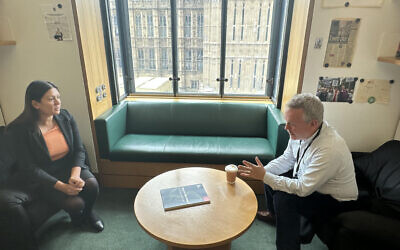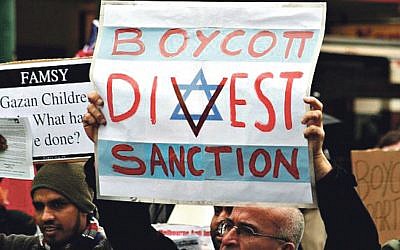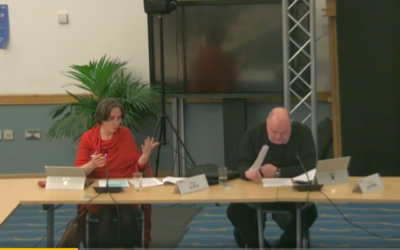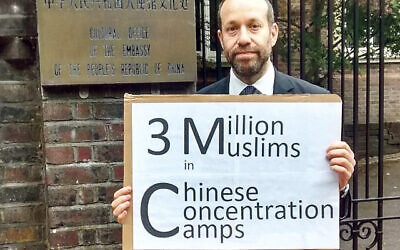INTERVIEW: Lisa Nandy: Labour ‘absolutely shares’ government’s concern over BDS
EXCLUSIVE: The Labour frontbencher confirms to Jewish News her party will be raising objections to Michael Gove's anti-BDS legislation, adding 'it's not clear the bill does what the government thinks it does'
Lee Harpin is the Jewish News's political editor
Labour frontbencher Lisa Nandy has said her party “absolutely share” the government’s belief that boycott, divestment and sanctions (BDS) campaigns against Israel can be adopted in this country to “whip up hostility against the Jewish community”.
Confirming her own long-held viewpoint that BDS “singles out the world’s only Jewish state to different standards” and can also be used “as a way to strip up hatred towards the Jewish community here in the UK”, Labour’s shadow communities secretary told Jewish News her party was “not going to change our position on this, not now, and not in government.”
Pressed repeatedly to confirm that Labour would not reverse their anti-BDS policy if elected into government at the next general election, Nandy said forcibly: “We absolutely will not.”

The Wigan MP added that under Keir Starmer’s leadership the party were “not just concerned about the way in which BDS has become used to stir up hostility towards the Jewish community here in the UK, but because we don”t believe there is any meaningful route to peace for the Palestinians or for Israel without bringing people together, without co-existence projects, without supporting joint ventures that have emerged.”
BDS, Nandy said, “drives coaches and horses through this.”
She added:”The context of this is that we have seen a dramatic rise in antisemitism over the last decade and we’ve also seen BDS used particularly on social media, along with the word Zionist, as a term of abuse towards Jewish people.
“What is positive is there is a strong view from parties across parliament, not least Labour, that BDS has been used by some in order to stir up hate against the Jewish community, and we won’t stand for that.
“It’s the singling out of the world’s only Jewish state, the different standards and treatment, and the way in which in some cases this has been used to stir up antisemitism that necessitates the need for action.”
But, despite this firm pledge, Nandy revealed that after studying the finer detail of the anti-BDS bill introduced by secretary of state Michael Gove in parliament last week, which promised to make it illegal for local authorities, or any public body, to implement BDS, Labour WILL be raising objections to some parts of the proposed legislation.
“We’ve taken legal advice over the bill,” she confirmed. “It’s not at all clear the bill does what the government thinks it does.
She said one of the concerns lawyers had raised is that it could potentially open up the prospect of endless litigation in the courts over the practice of BDS.
“The legislation itself is a real mess,” she claimed. “It needs a lot of work to resolve this. It’s unclear why the government needed to run into these problems when they could have put forward a very straightforward legislation that I’ve been clear with Michael Gove Labour would have supported.”

Nandy said she had already discussed some of Labour’s concerns with Jewish groups, and would be publishing the legal advice ahead of the bill’s second reading in parliament.
“In relation to this bill, we will be honest with them,” she said. “There are members of the Jewish community who I know strongly back this bill, but others within the community who have significant concerns about the legislation. We are prepared to have those conversations, we learn from them.
“But we are not in the business of supporting bad law, and that is why the ball is very much in the government’s court. There is a way to achieve this without these far-reaching consequences and we very much hope the government hears that message loud and clear.”
Having spoken with communal organisations on a frequent basis about the need for legislation preventing BDS, Nandy stressed that organisations such as the Board of Deputies, the Jewish Leadership Council and the Holocaust Educational Trust remained “important partners for us in terms of hearing the concerns of the Jewish community in the UK.”
The MP said:”In particular with this bill I’ve been talking to the Jewish community leaders about it for some time.
“We’ve heard very loud and clear that this is legislation that they have long wanted to see on the statute books, but until recently we didn’t know what that legislation has looked like.”
But she added: “Now the bill is published it has become clear that there is significant opposition to it, some of which is held by people in the Jewish community.”
Jewish News had previously reported on how leading Israeli human rights organisations had joined with groups like Yachad in raising objections to the bill, while the Union of Jewish Students had passed a motion saying the bill would “do nothing” to assist the fight against antisemitism.
Over the past few days Nandy had also held meetings with Progressive Judaism representatives and Jewish youth group leaders who have stressed their own boycott of goods from Israeli settlements.
She said Labour would itself “support people being able to make their own choices about what they buy or don’t buy” and added “better labelling of products is really important.”
Nandy said Labour have now presented “a simple and straightforward way for the government to deal with this” adding she had written to her opposite number Gove last week “when concerns started to be raised about the content of the legislation to suggest a way forward.”
She noted that an amendment tabled by Labour to the government’s public procurement bill “sought to prevent councils in particular from singling out Israel for special treatment and standards that wouldn’t apply to others.”

Labour had tabled the amendment, in response to an attempt to introduce BDS on Wirral Council. In February 2022 Jewish News reported on how the bid to make Wirral council pension fund divest from nine Israeli firms was defeated.
But a subsequent Labour amendment was opposed by the Tories in the House of Lords. In a response to Nandy’s letter to him, Gove said that on the issue of the Labour amendment he had been advised it would “not meaningfully stop BDS.”
Nandy said Labour believes councils and public bodies are entitled to take ethical decisions on behalf of the people they represent. “Often this is a better investment than when not taking ethical considerations into account,” she added.
But the party was opposed to the singling out of a country like Israel for boycotts, in exactly the same way it would oppose the singling out of a country like China.
“The bill has been drawn very widely,” Nandy reasoned.
“It gives far reaching powers to the secretary of state, and has a number of far-reaching implications, none of which appear to have anything to do with tackling BDS, the issue the government says it wants to solve, which we share.”
She also noted that concerns had been raised about the bill by senior Conservative politicians, including Alicia Kearns, chair of the influential foreign affairs committee.
Kearns said that while she supported the principle that taxpayers’ money should not be used to undermine the government’s foreign policy, she was concerned that Michael Gove’s Economic Activity of Public Bodies (Overseas Matters) Bill specifically named the state of Israel.
The Tory MP said:“We should not do country-specific legislation as it undermines our foreign policy. I also worry whether this will undermine community cohesion.”
The bill would allow ministers to use regulations to make a country or territory exempt from its provision – unless it is Israel, the occupied Palestinian territories or the occupied Golan Heights.
Noting Kearns concerns around the naming of Israel, Nandy said the bill “seems to overturn a long-standing government position, on which there is cross-party consensus.”
She said this particularly applied to the settlements and the impact that were having both on the Palestinians and for a two-state solution. Labour continued to believe settlements in the West Bank were illegal, adding “until recently this was a view shared by the government.”
But Nandy said Labour also had concerns that by singling out Israel in the bill, this was actually doing “what it set out to prevent.”
The MP said this naming of Israel “seemed to set an unhelpful precedent in law” adding “it was unclear why the government had decided to do that.”
Nandy said there was added concern that as the bill is currently conceived “it will prevent councils and other public bodies taking action in support of the Uyghur Muslims in the Chinese province of Xinjiang and that is obviously a major concern to a lot of people in the House, including the Labour Party.”

“It is a major concern that when the government is refusing to take firmer action, those public bodies will be prevented from doing so, ” she added. “They could face fines or imprisonment (under the bill) if they even express a view.
“The Board and many other Jewish organisations have been superb in standing up for the rights of the Uyghur Muslims. Jewish leaders across the board have spoken out and were right to do so.”
The shadow minister also recalled the 2018 chemical poisoning incident in Salisbury in which “agents of the Russian state were responsible for the murder of people on the streets of Britain.”
Nandy said:”It would be extraordinary in those circumstances if the local council wasn’t able to express a view about what happened or take action without having to seek permission from the secretary of state first. It just seems to be absurd.”
Nandy also recognised that “a number of Conservative backbenchers” alongside several legal experts, and civil society organisations like Liberty, had also raised concerns about the bill’s impact on freedom of speech.
“The bill just doesn’t prevent local authorities from taking investment and procurement decisions,” she said, “it also prevents them from expressing a view about foreign policy matters unless it’s in accordance with the government’s own foreign policy.”
Supporters of the bill, including some communal leaders, have attempted to argue that local councils have no right to engage in foreign affairs issues, and should concentrate on more immediate concerns of local residents.
But Nandy disagrees.
She says:”To give you an example, in my constituency in Wigan, the council is currently developing the town centre. It has contracted a Chinese company to do the construction work, and the Conservative council in Bolton has also used the same company.
“Thousands of locals signed a petition. This bill would effectively prevent the council from even responding to that petition and expressing a view.
“We live in a globalised world. Councils and mayors and public bodies are working with governments all over the world, and engaging in foreign policy issues all of the time.
“These far-reaching powers in the bill, the Conservatives and others who have raised objections to them are right to say ‘these are disproportionate, they are unnecessary’.”
In recent days, Nandy said, the Local Government Chronicle had themselves raised “significant concerns” about the impact of the legislation, the way it is currently drafted.
Some pensions experts also fear the bill could have “unintended consequences” and instability around the pension funds of around six million people.
Nandy said a simpler way to prevent BDS being used to whip up hostility against the Jewish community in this country “is to introduce a clause in the bill that seeks to prevent councils or public bodies from taking investment or procurement decisions in relation to one country or territory that they would not have taken in relation for others. To operate within an ethical investment framework that is published and is transparent.”
She said this had now been offered to Gove and “there is no reason with some goodwill on behalf of the government that we shouldn’t be in a position to pass legislation that the Jewish community has fought for and wanted over a long period of time to tackle what we accept is a real problem.
“But it will take good faith and a rethink by the government in how they frame this legislation. We have offered a route forward that we believe could solve many of the problems on their own backbenches and remove the unintended consequences from the bill.

Asked if Labour’s decision to push for change in Gove’s bill was a result of newfound confidence in the party that this issue would not fuel charges of antisemitism from critics, Nandy said:”I think there is a general view that Keir has been true to his word. That we’ve made huge strides forward.
“It was a big moment being taken out of special measures by the EHRC. Like Keir said, this was not a cause for celebration because we should never, ever have allowed that to happen in the first place.”
Nandy, who was picked over Starmer as the Jewish Labour Movement membership’s choice for leader of the party in 2020, said the party was “still on a journey” to root out antisemitism.
“It’s been a whole team effort, Keir, Angela (Rayner), David (Evans). If it was just one of us, I don’t think we would be in the position we are in now, but it’s been clear that every single member of the shadow cabinet is determined that this will be part of the legacy of this period.
“Never again will we allow the Labour Party to be synonymous with antisemitism, or any form of racism. It’s been a special thing to win back some sections of the Jewish community over the past few years. They know that we myself, with Keir and others, this is something that profoundly matters to us.
And if Labour do, as many are now predicting, do return to power at the next election, does Nandy foresee a new role for herself in Starmer’s first ever cabinet in power.
“I won’t deny that when we were in the (Levelling Up) department on Monday I was sizing up the furniture,” she says, with a smile on her face.. “The only thing I don’t like about my current job is the word ‘shadow’.
“I very much hope I can drop it next year.”

Thank you for helping to make Jewish News the leading source of news and opinion for the UK Jewish community. Today we're asking for your invaluable help to continue putting our community first in everything we do.
For as little as £5 a month you can help sustain the vital work we do in celebrating and standing up for Jewish life in Britain.
Jewish News holds our community together and keeps us connected. Like a synagogue, it’s where people turn to feel part of something bigger. It also proudly shows the rest of Britain the vibrancy and rich culture of modern Jewish life.
You can make a quick and easy one-off or monthly contribution of £5, £10, £20 or any other sum you’re comfortable with.
100% of your donation will help us continue celebrating our community, in all its dynamic diversity...
Engaging
Being a community platform means so much more than producing a newspaper and website. One of our proudest roles is media partnering with our invaluable charities to amplify the outstanding work they do to help us all.
Celebrating
There’s no shortage of oys in the world but Jewish News takes every opportunity to celebrate the joys too, through projects like Night of Heroes, 40 Under 40 and other compelling countdowns that make the community kvell with pride.
Pioneering
In the first collaboration between media outlets from different faiths, Jewish News worked with British Muslim TV and Church Times to produce a list of young activists leading the way on interfaith understanding.
Campaigning
Royal Mail issued a stamp honouring Holocaust hero Sir Nicholas Winton after a Jewish News campaign attracted more than 100,000 backers. Jewish Newsalso produces special editions of the paper highlighting pressing issues including mental health and Holocaust remembrance.
Easy access
In an age when news is readily accessible, Jewish News provides high-quality content free online and offline, removing any financial barriers to connecting people.
Voice of our community to wider society
The Jewish News team regularly appears on TV, radio and on the pages of the national press to comment on stories about the Jewish community. Easy access to the paper on the streets of London also means Jewish News provides an invaluable window into the community for the country at large.
We hope you agree all this is worth preserving.






















